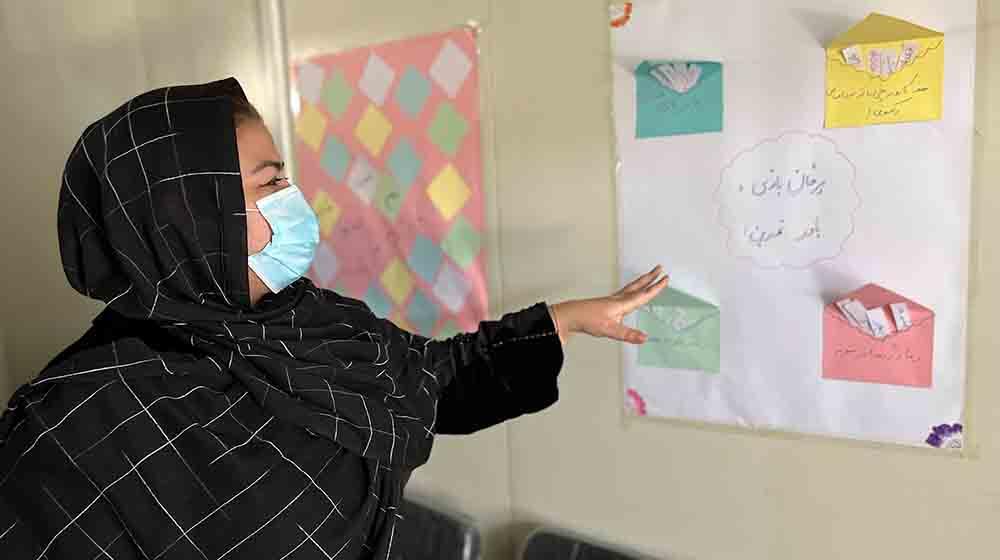Spin Boldak, Kandahar – “A new dress.” Dr. Adela Yadgaar reads out loud some of the writings on sticky notes answering the question “What makes you happy?” posted on a board inside the Women-Friendly Health Space (WFHS) at the zero point camp in Spin Boldak.
She then moves to another section of the wall and reads: “Tailoring,” which answers the question “What is your skill?”
Dr. Yadgaar works as a Technical Manager for Mental Health and Psychosocial Support Services (MHPSS) in the UNFPA-supported WFHS at the zero point camp in Spin Boldak, where Afghan returnees, mostly coming from the bordering Pakistan, are processed and receive various services from humanitarian agencies.
The WFHS provides psychosocial support services to women and girls arriving at the camp, wanting to return to Afghanistan. About 40 to 45 Afghan families are crossing the border every month, according to local NGOs. While a number of them are deportees, the majority are voluntary returnees – some of them have been away from Afghanistan since their childhood.
Psychosocial support services are as life-saving as food, water and shelter in any humanitarian response, especially for people who have experienced extremely distressing events, have been displaced, or returning to their communities.
“Mental health issues are very common among returnees that cross the border every day,” says Dr. Yadgaar. “We conduct activities here at the WFHS that help women and girls feel positive about themselves again and gain self-confidence as they face a new life back in their communities.”
Pointing at the board, where she earlier read notes from women and girls who have participated in their activities, Dr. Yadgaar continued: “We ask questions such as ‘what is your skill?’ ‘what makes you happy?’ ‘what’s your goal in life?’ to help them focus on their strengths and positive traits.”
She said an average of 15 to 20 women and girls participate in the WFHS activities daily. Through such activities, the WFHS helps prepare the women and girls for reintegration into their communities.
UNFPA is able to keep the WFHS operational at the zero point camp through the support of the Government of the United Kingdom to UNFPA’s humanitarian work in Afghanistan, which prioritizes the well-being of women and girls impacted by the crisis.
Aside from the WFHS, the United Kingdom also supports the provision of emergency supplies including reproductive health kits, dignity kits and winterization kits for the most vulnerable Afghan population.
At the recent launch of the UNFPA Humanitarian Action 2023 Overview, Ambassador James Kariuki, the UK Deputy Permanent Representative to the UN, underscored the importance of supporting UNFPA’s work for the health and protection of women and girls in humanitarian settings.
“The UK’s aim is to strengthen people’s ability to recover from crises, to protect and prioritize the most vulnerable when crises occur, and to amplify the voices of the most marginalized, in particular women and girls, to ensure their needs are met,” Mr. Karikuki said.
At present, there are 61 WFHSs supported by UNFPA across Afghanistan, providing psychosocial support and information, and skills training for women and girls.


